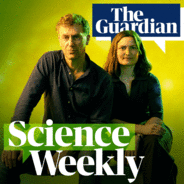More than half a century after humans last walked on the moon, researchers have made a discovery that makes lunar living an increasing possibility. The moon’s surface is littered with tiny glass beads containing water, which could be extracted and used by visiting astronauts. Ian Sample speaks to Professor Mahesh Anand, part of the team that made the discovery, about where these beads come from and what they mean for future moon missions. Help support our independent journalism at theguardian.com/sciencepod

Wissenschaft & Technik
Science Weekly Folgen
Twice a week, the Guardian brings you the latest science and environment news
Folgen von Science Weekly
300 Folgen
-
Folge vom 30.03.2023Glass beads full of water on the moon: what does the discovery mean for space exploration?
-
Folge vom 28.03.2023Could faecal transplants be the next frontier in health?Madeleine Finlay hears from science correspondent Linda Geddes about her experience becoming a faecal transplant donor, how getting a dose of someone else’s gut bacteria could treat illnesses like arthritis, diabetes and cancer, and asks whether a pill made from poo is an idea we are ready to swallow. Help support our independent journalism at theguardian.com/sciencepod
-
Folge vom 23.03.2023Three years on: are we any closer to understanding long Covid?Ian Sample hears from Scotland’s Astronomer Royal Catherine Heymans about her experience of long Covid and how it has impacted her life. He also speaks to Professor Danny Altmann, an immunologist at Imperial College London, about the current scientific understanding of the condition, and whether we’re any closer to a treatment.. Help support our independent journalism at theguardian.com/sciencepod
-
Folge vom 21.03.2023Willow Project: what could the ‘carbon bomb’ mean for the environment?Madeleine Finlay speaks to Guardian West Coast reporter Maanvi Singh about the Biden administration’s approval of a controversial new oil drilling project on Alaska’s North Slope. She also hears from Kristen Monsell, a senior attorney at the Center for Biological Diversity, which is part of a coalition that’s filing a lawsuit to challenge the decision.. Help support our independent journalism at theguardian.com/sciencepod
